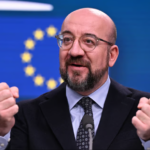Energy News Beat
Billions of euros earmarked to boost renewable energy and slash emissions are on the cutting block after EU leaders proposed moving them over to fund immigration and defense efforts instead.
The move came during this week’s EU leaders’ summit in Brussels, where European Council President Charles Michel proposed axing nearly all of a €10 billion fund meant to help Europe build out energy networks of the future — wind turbines, hydrogen plants, carbon capture. The effort is a crucial part of the EU’s response to the U.S. spending splurge on renewable energy incentives, which includes hundreds of billions in subsidies.
While countries like France, Italy and Spain have publicly backed the €10 billion initiative, Brussels is facing criticism from more frugal European capitals, particularly in the north, that want to limit their EU budget contributions and ensure there is money for competing priorities like curbing illegal immigration and rising military expenditures.
Michel’s compromise would drop the renewables fund — officially dubbed the Strategic Technologies for Europe Platform, or STEP — to just €1.5 billion. The remaining money initially meant for the effort would get rolled over into a cash pot for military investments, according to the latest proposal.
In exchange, Brussels would offer countries more flexibility in how they can use payouts from the EU’s “cohesion” fund — budgetary injections for lower-income states designed to reduce economic inequality. In theory, that would enable countries to continue some needed renewable energy investments.
“This allows countries with access to European funds to use them in a simple and flexible way,” said one diplomat granted anonymity to comment on the negotiations.
Yet the potential cut is a foreboding signal of Europe’s mounting struggle to source the massive investments needed to hit its climate goals. Germany, Europe’s largest economy, also had to drastically scale back its climate budget recently after a court ruling. And railing against the EU’s green transition costs has proved a winning political talking point for some on the right.
“We know that it’s not enough money,” said a second diplomat with knowledge of the talks, who acknowledged the diminished fund will only provide enough cash for “targeted” measures.
The “reality is really tough,” the diplomat added. “Budgets are tough everywhere.”
Renewable crisis
The plan to drastically slash the EU’s green tech fund does not have unanimous support. Leaders were unable to strike a final deal on Thursday night and will have to resume discussions in January ahead of an emergency EU leaders’ summit.
Portuguese Prime Minister António Costa told fellow EU leaders that he was disappointed about the cuts, according to people briefed on the talks, and Bulgarian Prime Minister Nikolay Denkov proposed diverting unused funds from the EU’s post-pandemic recovery cash.
Portuguese Prime Minister António Costa told fellow EU leaders that he was disappointed about the cuts | Miguel Medina/AFP via Getty Images
Thomas Pellerin-Carlin, director of EU climate investments and cleantech at the Institute for Climate Economics, warned the compromise could be catastrophic for the clean tech industry, particularly given the growing competition from the U.S. and China.
“Previously, you could guesstimate that around 50 percent of STEP funds would go to climate, and now you can guesstimate it will be around 0 percent: that money could go from 5 out of 10 billion to 0 out of 1.5 billion,” he said.
For the EU, that means a regression in key climate funding just as scientists insist much more money is needed.
“We could end up having less EU funding for clean tech in 2024 than we had in 2022,” Pellerin-Carlin said. “It’s not that we’re stepping up, it’s that we’re discussing stepping down even beyond just keeping the status quo.”
MEPs are also furious about the suggestion, which flies in the face of the European Parliament’s repeated calls for STEP to receive more funds, not less. Their request faced opposition from EU capitals which, at a competitiveness council last week, largely pushed back against establishing a direct line of funding between the proposed Net Zero Industry Act and STEP.
“Cutting important research funding to the benefit of other programs is not acceptable, as it threatens Europe’s future wellbeing and competitiveness,” said Christian Ehler, a lead European Parliament negotiator on STEP and the industry, research and energy spokesperson for the center-right European People’s Party group. “We will continue to fight for our budget until there is an agreement that lives up to these promises.”
For the EU, that means a regression in key climate funding just as scientists insist much more money is needed | Michal Cizek/AFP via Getty Images
Meanwhile, fellow STEP negotiator, Portuguese MEP José Manuel Fernandes, urged “EU leaders to return to the negotiating table in January and match their actions to their words. STEP is essential to enable the EU to invest in strategic technologies. If we don’t boost competitive European industry and innovation we will be stifled and citizens will suffer the consequences.”
In November, the European Climate Neutrality Observatory warned a lack of EU-level public investment in green energy and other advances could mean the Continent fails to meet its net zero goals.
“We need to see a faster pace of progress in clean tech innovation and manufacturing capacity within Europe in order to meet climate neutrality by 2050 at the latest,” said Aneta Stefańczyk, one of the paper’s authors at the time.
source: Politico
The post EU’s green funds are under the guillotine appeared first on Energy News Beat.








